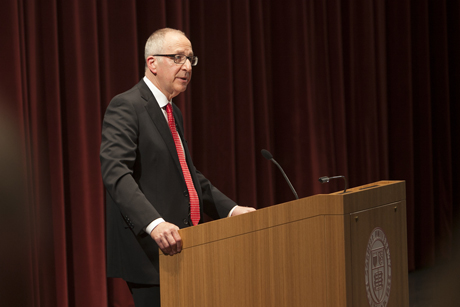By Daniel Aloi
Reprinted from Cornell Chronicle, June 11, 2013

President David Skorton focused on Cornell’s accomplished faculty and the strategic priority of faculty renewal in his State of the University Address to an audience of alumni and friends June 8 in Bailey Hall during Reunion Weekend 2013.
“So many of you have warm memories of your professors at Cornell … who awakened an interest in you, ignited a spark, provided a foundation of knowledge, opened doors, guided you,” he said. “You remember the faculty members who taught you and mentored you and helped set you on your life’s path – and who, in many cases, have cheered you on and offered continuing counsel over the years.
“Since its founding … the faculty at Cornell have been the heart of the university, and they continue to make Cornell the acclaimed and heavily sought-after institution it is today,” he continued.
“Cornell faculty today are at the top of their game,” Skorton said. “But like all of us, they are getting older.”
Last fall, more than 43 percent of the faculty was over age 55 and more than 13 percent was 65 to 74. “Over the next decade, we expect to have to recruit up to a third of our faculty and our superb staff,” Skorton said. “That presents us with a once-in-a-generation opportunity to maintain strength across all areas of this university while building leadership in selected areas of strategic importance – and we are seizing the moment.”
Cornell has hired about 150 new faculty members in Ithaca and around 170 at Weill Cornell Medical College in the last two years alone, Skorton said.
Three deans were among senior faculty recruits this year, including Gretchen Ritter ’83, attending her 30th reunion, who will helm the College of Arts and Sciences beginning Aug. 1.
“They are joined by talented, even younger faculty, many of them hired as part of the $50 million Faculty Renewal Sesquicentennial Challenge,” which has raised more than $40 million towards it goal, Skorton continued.
He singled out several new sesquicentennial and faculty fellows, all assistant professors, including Eilyan Bitar of electrical and computer engineering, whose research includes “the integration of renewable energy resources like wind and solar into the power grid”; Elena Belogolovsky of human resource studies in the ILR School; Julio Giordano, an animal science and dairy cattle management researcher in the College of Agriculture and Life Sciences; Ishion Hutchinson, English, who led MFA poetry seminars this spring; and Nathan Spreng of human development in the College of Human Ecology, who directs the Laboratory of Brain and Cognition.
Other notable recruits Skorton highlighted were Deborah Estrin, the first professor at the Cornell NYC Tech campus and a professor of public health at Weill Cornell Medical College; cancer researcher Dr. Lewis Cantley, Ph.D. ’75, who will direct the newly established Cancer Center at Weill Cornell and NewYork-Presbyterian Hospital; Dr. Augustine Choi, one of Wired magazine’s “50 People Who Will Change the World” in 2012, joining Weill Cornell in August as chair of the Department of Medicine and physician-in-chief at NewYork-Presbyterian/Weill Cornell.
“In this final push to Cornell’s sesquicentennial, faculty renewal remains our first priority, along with accessibility of a Cornell education,” Skorton said.
He quoted the late Cornell psychology professor Harry Levin, Arts and Sciences dean from 1974 to ’78: “‘Our aim is to get the best faculty and to turn them loose. They must be totally independent, responsible only to the quality of their teaching and their scholarship. All we ask of them is that they be geniuses.’”
“You can be proud that Cornell has reached a new high point,” Skorton concluded. “Never in our history have we been stronger or better positioned to meet the needs of our students and the challenges of the world.”

